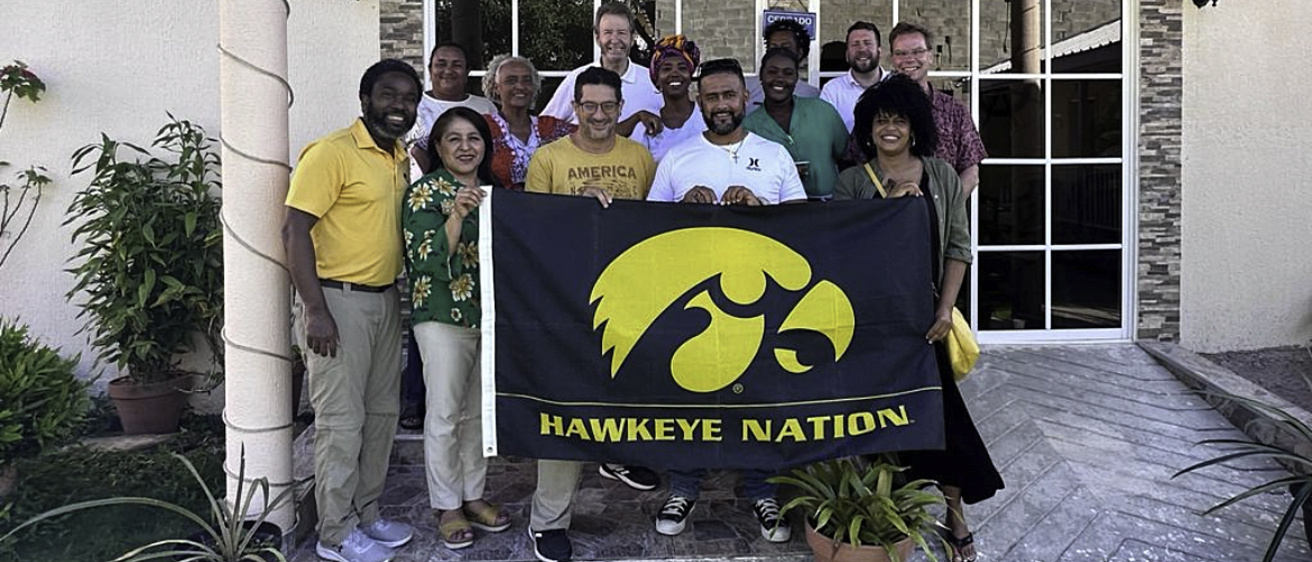by Tom Snee
San Andrés and Providencia are two Colombian islands in the Caribbean with a unique culture passed down from the islands’ original settlers for centuries.
But in recent decades, this Raizal culture has been threatened by a growing tourist trade that’s overwhelming it with the monotony of global brands and high-end resorts.
While the Colombian government wants to encourage tourism to develop the islands’ economies, it also wants to protect their native cultures. To do so, government officials are working with native artists, musicians, actors, writers, educators, restaurateurs, and others who work in cultural preservation to build a creative economy that turns their efforts into viable businesses. The goal is to both develop the economy and protect the local culture.
The Colombian Ministry of Culture has turned to a team of University of Iowa development experts to help. The five-member team spent two days on each island in February helping local entrepreneurs learn more about the basics of running a business. Their visit was sponsored by the U.S. Embassy in Colombia.
“We’re helping people commercialize their talents and inventions and empowering them to keep their music, their food, and other parts of their culture alive and relevant,” said Dimy Doresca, director of the Institute for International Business in the Tippie College of Business. He was joined by experts from the John Pappajohn Entrepreneurial Center (Iowa JPEC), and the School of Music in the UI College of Liberal Arts and Sciences.
“It puts tools in their hands so they can strengthen their businesses,” said Doresca. The participants learned from a modified version of Venture School, a business education curriculum that teaches entrepreneurs the basics of running a business in a compressed timeframe. Among the skills the entrepreneurs learn is pricing their product or service, identifying who their customers are and what they want, and developing marketing and social media strategies that reach them.
Team member Gabriela Rivera, associate director of engagement and belonging in Tippie, said most of the local entrepreneurs on the islands are social entrepreneurs in the truest sense. Their business goal is preserving their culture while earning a living—their focus is not on profit and loss.
“Their culture and their families are everything, and they’re very centered on a communal way of doing business,” Rivera said. “It’s not just helping you as a customer, but what else can they do to serve you, to help you. They want to get to know you and learn from you.”
Many of the participants have been in business for some time, while others are still in the startup stage. For all of them, this is the first time they’ve received this kind of expert training in successful entrepreneurship. Two participants own music schools that work to preserve native Caribbean rhythms. Another business programmed a weekly “Caribbean Night” series of events that presented authentic local food and music to tourists staying at resorts.
“The resorts are not embracing the local culture, so many of these businesses owned by local entrepreneurs provide an introduction to tourists who want to learn more,” Doresca said.
The next step will be connecting the businesses with students in Iowa JPEC, who can serve as consultants and help provide guidance to the entrepreneurs. Doresca said he wants the program to be more than just a two-day session. He wants to build lasting relationships between the entrepreneurs and the university.
Other team members included Trevor Harvey, an ethnomusicologist and associate professor of instruction at the UI School of Music, Gregg Barcus, an adjunct lecturer in management and entrepreneurship for JPEC, and Greg Stevens (BA05), a technology consultant and internationalization specialist.
MEDIA CONTACT: Tom Snee, 319-384-0010 (o); 319-541-8434 (c); tom-snee@uiowa.edu
